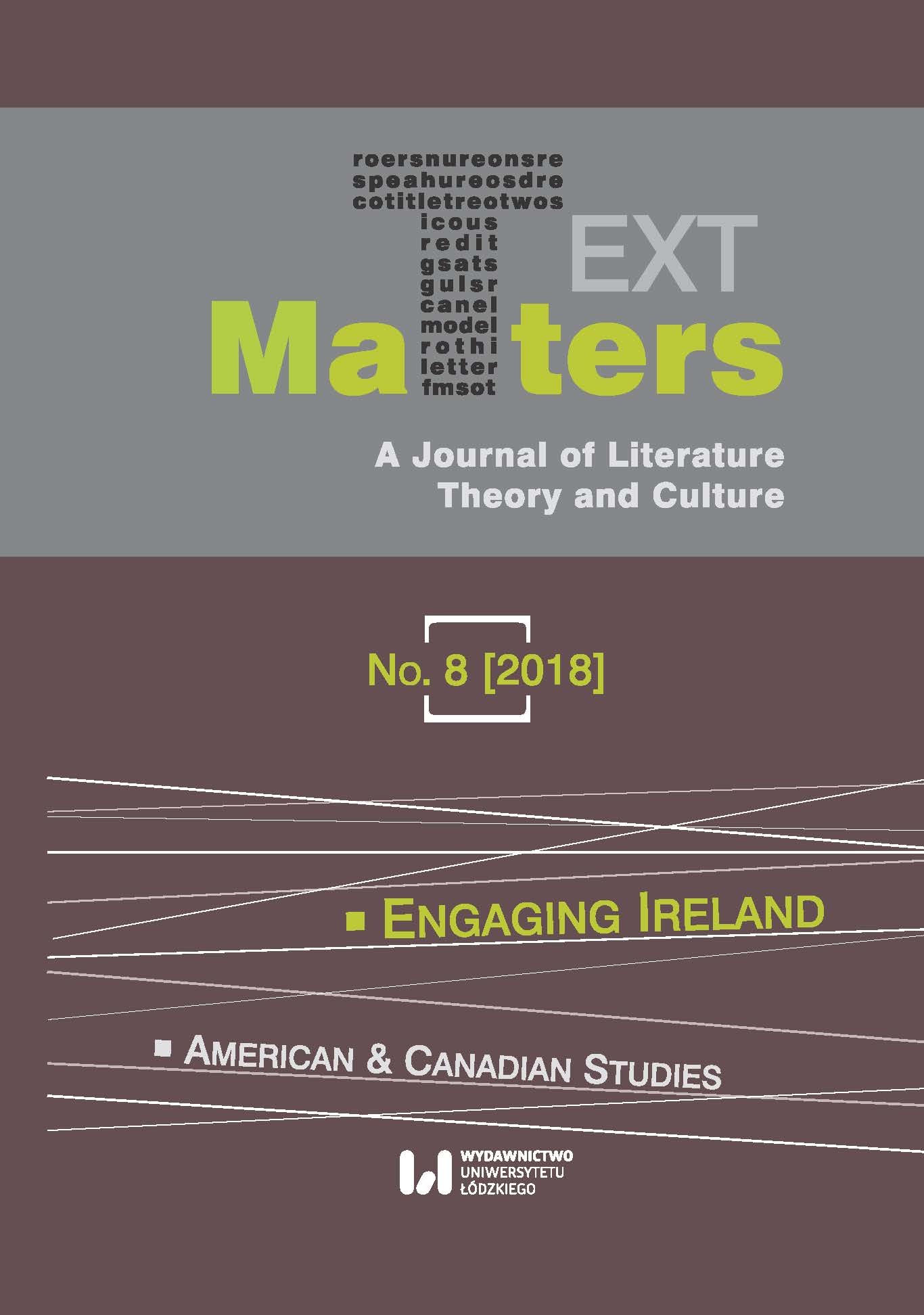The Whittrick Play of No Nothing: Alan Spence, Edwin Morgan, and Indra’s Net
DOI:
https://doi.org/10.1515/texmat-2018-0012Keywords:
Alan Spence, Edwin Morgan, dialogicality, trickster play, Indra’s netAbstract
The article will attempt a reading of Alan Spence’s play No Nothing (2015). Special attention will be given to the issue of literal and metaphorical space(s), a peculiar, liminal setting of the play, and the ways it determines the flyting between the two characters, two iconic Glaswegians: Edwin Morgan and Jimmy Reid. It seems that in this theatrical space history, politics and poetry inter-are. We may notice how two completely different masters of speech (a poet and a trade union leader) exchange their views on life, how they reflect upon the meaning of their achievements, and how they find a space of convergence in their affirmation of life. As their flyting is “about life, the Universe and everything—from Glasgow to Infinity and beyond,” the article will also address the space of dialogue between Spence’s and Morgan’s poetry. The metaphor of Indra’s net will serve as a useful tool in exploring spatial dimensions of the play and the issue of interconnectedness.
Downloads
References
Bakhtin, Mikhail. Problems of Dostoevsky’s Poetics. Trans. Caryl Emerson. Minneapolis: Minnesota UP, 1984. Print.
Google Scholar
Beacom, Brian. “Interview: What if Jimmy Reid and Edwin Morgan Met in the Arterlife?” Eveningtimes.co.uk. Evening Times 20 Apr. 2015. Web. 1 Aug. 2016.
Google Scholar
Bell, Eleanor. Questioning Scotland: Literature, Nationalism, Postmodernism. New York: Palgrave Macmillan, 2004. Print.
Google Scholar
Brennan, Mary. “Live Review: No Nothing, Oran Mor, Glasgow.” Heraldscotland.com. Herald Scotland 20 Apr. 2015. Web. 4 Aug. 2016.
Google Scholar
Sri Chinmoy. Jewels of Happiness: Inspiration and Wisdom to Guide Your Life-Journey. London: Watkins, 1999. Print.
Google Scholar
Cockburn, Paul F. “No Nothing.” Rev. of No Nothing, dir. Ken Alexander. Broadwaybaby.com. 27 Apr. 2015. Web. 4 Aug. 2016.
Google Scholar
Cook, Francis H. Hua-yen Buddhism. The Jewel Net of Indra. Delhi: Sri Satguru, 1977. Print.
Google Scholar
Crawford, Robert. “To change/the unchangeable—The Whole Morgan.” About Edwin Morgan. Ed. Robert Crawford and Hamish Whyte. Edinburgh: Edinburgh UP, 1990. 10–24. Print.
Google Scholar
Herbert, W. N. “Morgan’s Words.” About Edwin Morgan. Ed. Robert Crawford and Hamish Whyte. Edinburgh: Edinburgh UP, 1990. 65–74. Print.
Google Scholar
Holquist, Michael. Dialogism: Bakhtin and His World. London: Routledge, 1990. Print.
Google Scholar
Kocot, Monika. Playing Games of Sense in Edwin Morgan’s Writing. Frankfurt am Main: Peter Lang, 2016. Print.
Google Scholar
McGonigal, James. Beyond the Last Dragon: A Life of Edwin Morgan. Dingwall: Sandstone, 2012. Print.
Google Scholar
McGuire, Matt, and Colin Nicholson. “Edwin Morgan.” The Edinburgh Companion to Contemporary Scottish Poetry. Edinburgh: Edinburgh UP, 2009. 97–110. Print.
Google Scholar
McMillan, Joyce. “Legacy of our Lost Titans is their Belief in Human Worth.” Scotsman.com. The Scotsman 21 Aug. 2010. Web. 4 Aug. 2016.
Google Scholar
McMillan, Joyce. “On No Nothing at Oran Mor, Glasgow.” Heraldscotland.com. The Scotsman 25 Apr. 2015. Web. 5 Aug. 2016.
Google Scholar
Morgan, Edwin. Collected Poems. Manchester: Carcanet, 1996. Print.
Google Scholar
Morgan, Edwin. Glasgow University Special Collections Acc 4574/Box 26.
Google Scholar
Morgan, Edwin. Nothing Not Giving Messages: Reflections on His Work and Life. Ed. Hamish Whyte. Edinburgh: Polygon, 1990. Print.
Google Scholar
Morgan, Edwin. “Scottish Fiction.” Scottish Left Review Issue 60, Agenda 15 (2011). Scottishleftreview.org. Web. 7 March 2018.
Google Scholar
Niven, Liz. “Glasgow Zen by Alan Spence.” Scottish Studies Review 4.2 (Autumn 2003): 133–35. Print.
Google Scholar
Reid, James. Alienation. Rectorial Address Delivered in the University of Glasgow on Friday, 28th April 1972. Glasgow: U of Glasgow P, 1972. Print.
Google Scholar
Robertson, Robin. Indra’s Net: Alchemy and Chaos Theory as Models for Transformation. Wheaton, IL: Quest, 2009. Print.
Google Scholar
Snyder, Gary. The Practice of the Wild. Essays by Gary Snyder. San Francisco: North Point, 1990. Print.
Google Scholar
Spence, Alan. “Edwin Morgan: a Sunburst of Possibility Amid the Grey.” Theguardian.com. The Observer 22 Aug. 2010. Web. 1 Aug. 2016.
Google Scholar
Spence, Alan. Glasgow Zen. Edinburgh: Canongate, 2002. Print.
Google Scholar
Spence, Alan. No Nothing. Aberdeen: Aberdeen UP, 2015. Print.
Google Scholar
Spence, Alan. “No Nothing.” YouTube.com. YouTube 20 Apr. 2015. Web. 1 Aug. 2016.
Google Scholar
Spence, Alan. “Time for Reflection—Scottish Parliament: 25th October 2016.” YouTube.com. YouTube 25 Oct. 2016. Web. 26 Oct. 2016.
Google Scholar
Tagore, Rabindranath. Gitanjali. Song Offerings. Intr. W. B. Yeats. New Delhi: Full Circle, 2011. Print.
Google Scholar
Watson, Gay. Resonances of Emptiness: A Buddhist Inspiration for a Contemporary Psychotherapy. London: Routledge 2013. Print.
Google Scholar
Downloads
Published
How to Cite
Issue
Section
License
Copyright (c) 2018 A Journal of Literature, Theory and Culture

This work is licensed under a Creative Commons Attribution-NonCommercial-NoDerivatives 4.0 International License.













